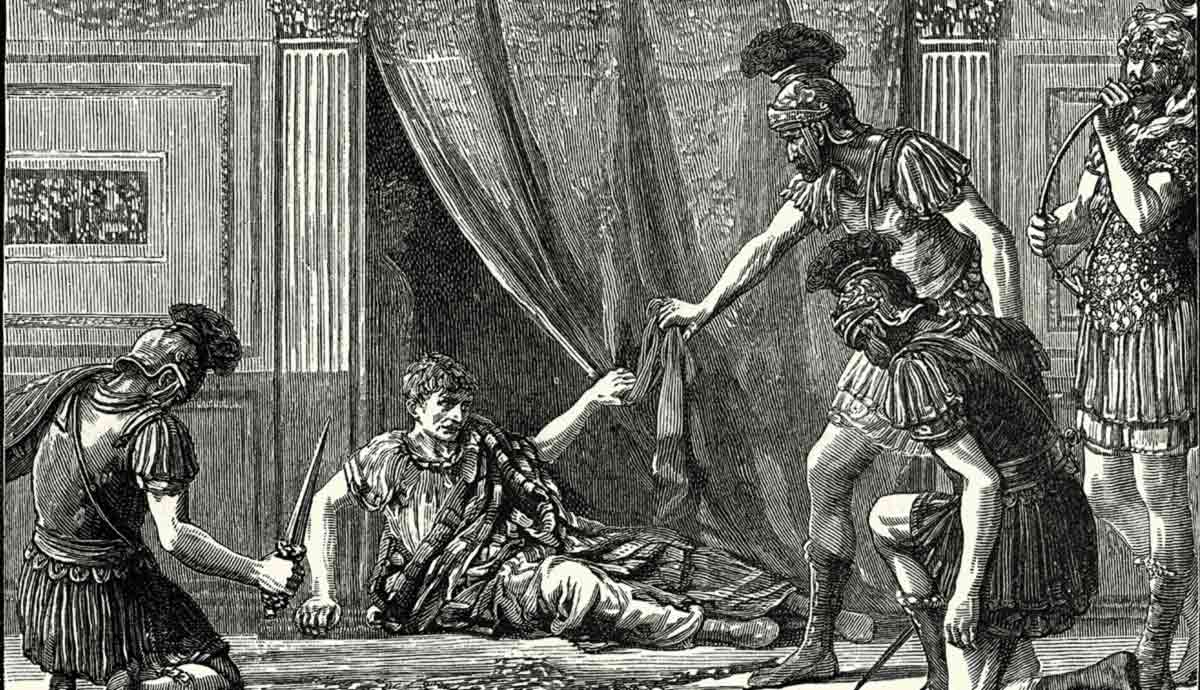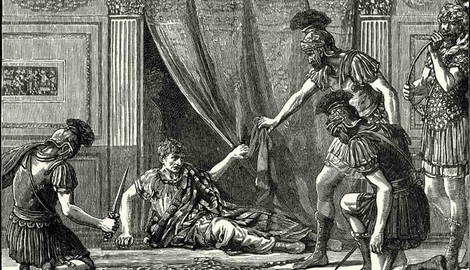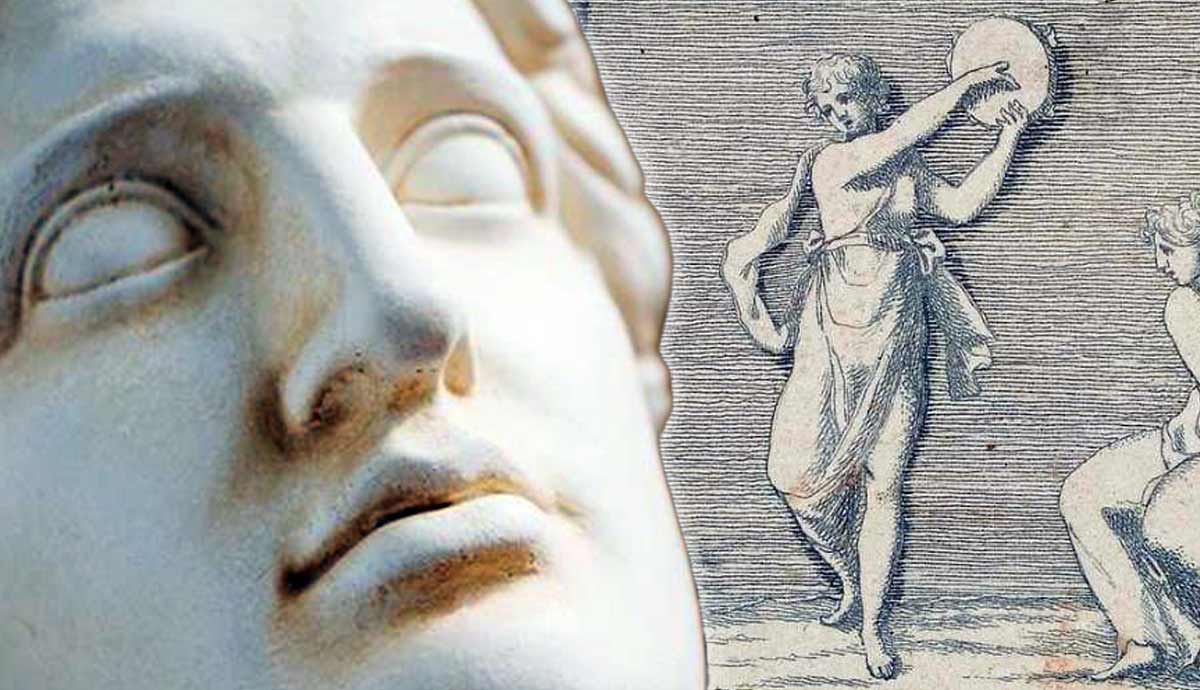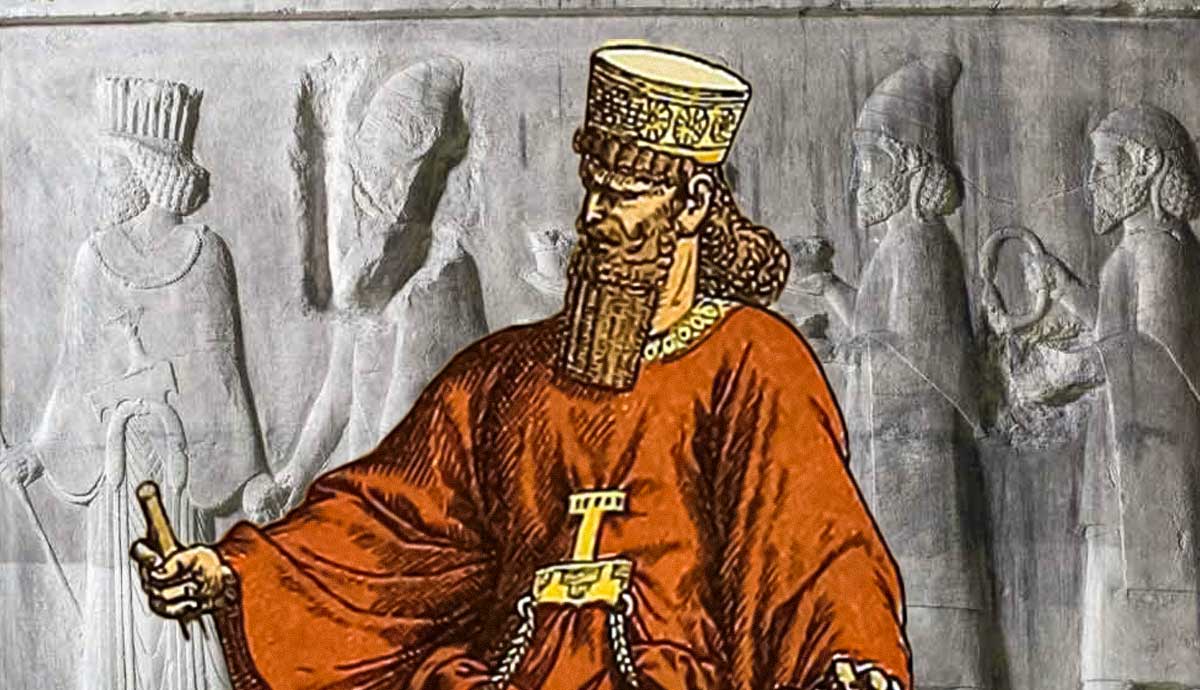
The Praetorian Guards were the personal bodyguard of the Roman Emperors from the reign of Augustus through to the rise of Constantine. From the first century CE to the early fourth, these soldiers had an unrivaled proximity to imperial politics. This made them incredibly important but also incredibly dangerous. From their barracks in the imperial capital, the emperor’s guards were just as likely to orchestrate their ruler’s downfall as protect him. Roman history is littered with tales of praetorian plots as ambitious guards sought to increase their power and influence. Others took it upon themselves to do away with emperors they thought no longer fit for purpose.
Imperial Guard: Who Were the Praetorians?

One way to determine whose support was important to the Roman emperors is who received a cash donative at the death or accession of an emperor. The plebians, average working Roman citizens, often benefited from this imperial largesse. So did the soldiers. Financial incentives helped keep the unruly mob from voicing too much dissent. It is telling, therefore, that in 14 CE, the will of the emperor Augustus bequeathed a payment of one thousand sesterces each to every member of the Praetorian Guard. This was significantly more than the 300 sesterces each for the legionaries.
Although they were more prominent during the imperial period, the cohors praetoria had been charged with guarding the commanders of the Republic’s armies since the 2nd century BCE. The transition from Republic to Empire, however, brought about significant changes. The Praetorians were posted in Rome to protect Octavian Caesar, and this was the first time soldiers were stationed inside the pomerium, Rome’s sacred boundary. They remained there even after Antony’s defeat at the Battle of Actium in 31 BCE, and their position was made permanent when Octavian adopted the name Augustus in 27 BCE.

The Praetorians’ proximity to the princeps and their important role in protecting him ensured that they enjoyed a number of considerable perks over other soldiers, not just substantially better pay. The guards were commanded by the Praetorian Prefect(s), an equestrian who often combined this ostensibly military role with a number of other administrative functions.
Many treated the Praetorians with suspicion and fear, but their proximity to the epicenter of Roman power ensured that throughout Roman history, they were often intimately involved in the grand dramas of imperial power.
Treason and Tiberius: The Rise and Fall of Sejanus

Tiberius was the successor to Rome’s first emperor, Augustus. There is a pervasive sense from the sources that, as much as Augustus had attempted to find any successor other than Livia’s son, Tiberius was equally reticent to wield imperial authority. Suetonius records a painful exchange between Tiberius and the senate in which the new emperor awkwardly attempted to renounce the excited senate’s offer of the imperial purple in 14 CE. By 26 CE, Tiberius had retreated from political life in Rome to the villa complex at Capri on the Campanian coast. There, he reportedly descended into debauchery.
While the emperor was absent, the running of Rome was left to Lucius Aelius Sejanus, the Praetorian Prefect. Sejanus had been employed in imperial service for decades previously before being made prefect in 15 CE. He was working with an emperor who was keen to rely on a small retinue of trusted advisers.

Even before Tiberius’ full withdrawal from Rome, Sejanus was already advancing quickly into a position of prominence. According to Tacitus, Tiberius ordered that statues of the prefect be erected in the city to celebrate the “partner of his toils.” Perhaps more ominously, the Praetorian Guards, previously dispersed across the city, were centralized within one camp on the edge of the city.
With the emperor absent from Rome, Sejanus moved to consolidate his authority. There was still, for a time, a serious obstacle in his way in the form of Augustus’ widow and Tiberius’ mother, Livia Augusta. However, her death in 29 CE effectively left him in a position of unrivaled influence in the imperial capital. Soon, purges of senators and wealthy members of the equestrian class were organized. These treason trials rid Sejanus of possible enemies across the Roman elite. Even the imperial family was not safe. Agrippina the Elder, the widow of Tiberius’ adopted heir Germanicus, perished mysteriously in exile along with her sons.

He reached the pinnacle of his power in 31 CE when he was made Roman consul, with the absent Tiberius as his colleague in office. But it was also this year that Tiberius discovered the extent of Sejanus’ ambition, including his role in the death of Tiberius’ son and second heir Drusus. Sejanus was summoned to a meeting of the senate in 31 CE where he was presented with a letter from Tiberius. It denounced him as a traitor and ordered his immediate execution.
Within a week, Sejanus was dead, but the secret was out. The Praetorians could be architects of political change in the empire. Within a decade of Sejanus’ murder, the guards elevated their own emperor when they discovered the terrified Claudius hiding in the imperial palace and made him their emperor. This was after the assassination of Caligula in a conspiracy involving the Praetorians.
Plautianus and the Severan Dynasty

The emperor Septimius Severus seized power in 193 CE. He was one of five rivals who emerged in the political turmoil that erupted with the assassination of the megalomaniac Commodus. Severus would eventually triumph following victory in the climactic showdown at Lugdunum, which was the largest battle ever fought by a Roman army. This left him the ruler of the Roman empire, but he needed to consolidate his authority.
While he had displayed his military acumen in command of the Roman armies, the situation in Rome itself was perhaps more precarious. Senatorial support was split between Severus and his rivals, and now there would need to be reconciliation or purges. Fortunately, Severus was able to rely on the support of his cousin, Gaius Fulvius Plautianus, who he promoted to Praetorian Prefect in 197 CE. Like Severus, Plautianus was a native of Leptis Magna, the grand trading city on the Mediterranean coast of Libya. While he is not as well known as the Sejanus, it is arguable that the influence of Plautianus at the height of his powers far exceeded that of the more notorious prefect.

Following an initial consolidation of power, cracks began to form. Factionalism soon cast a shadow over the Severan imperial court. Plautianus’ close relationship with the emperor saw him hoover up prestige, power, and wealth, culminating in the consulship in 203 CE, which granted him a seat in the senate.
Although Plautianus had already begun to alienate members of the Severan household, most notably the wife of the emperor, Julia Domna, he was able to confirm his prominence within the empire in 202 CE, when his daughter, Publia Fulvia Plautilla, was married to Severus’ eldest son, Caracalla.
Plautianus could not have asked for a more difficult son-in-law. The marriage between the emperor’s son and the prefect’s daughter was not a happy one. There were no offspring and the imperial heir reputedly refused to even share the same dining table or bedroom with his wife.
The relationship between Plautianus and the imperial heir was also marked by extreme antipathy. It has been suggested by some that such was Plautianus’ dislike of Caracalla that he actively advanced the cause of the heir’s brother, Geta. While the factional rivalry that was emerging between the two imperial sons may have been part of Plautianus’ political maneuverings, the extent to which he was actively involved is questionable. To be scheming too openly would have put the life of his daughter in extreme danger.
Much like with Sejanus, the scale of the prefect’s ambitions could be measured in his visibility. Statues and other images of Plautianus had been erected around the empire.

The collapse of Plautianus’ power, when it came, was swift and total. It began with a scheme of Caracalla. According to Cassius Dio’s account, the young man enlisted the help of his tutor, the freedman Euodus, to hire three centurions to carry out the plot. In January 205 CE, they presented Severus with “evidence” of Plautianus’ plans to have both the emperor and his heir murdered; their evidence was a letter from the prefect.
Plautianus was immediately summoned to the imperial palace. As he tried to protest his innocence, Dio claims that Caracalla lost all patience and his hatred of Plautianus bubbled up into violence. While he was restrained from delivering the final blow himself, he ordered soldiers in attendance to strike down Plautianus. Hairs from the prefect’s beard were plucked and taken next door to be presented to Julia Domna and, more horrifically, to his daughter, Plautilla. The gloating soldier proclaimed, “Look at your Plautianus!”
In the meeting of the senate that followed, Severus did not denounce the former prefect with the vehemence one might expect. Instead, he lamented the weakness of man and his own errors in bestowing honors and privileges on Plautianus.
The condemnation of the former Praetorian Prefect’s memory, a damnatio memoriae, was ordered. All around the empire likenesses of Plautianus were vandalized and his name erased from inscriptions. Such was the extraordinary amount of wealth that Plautianus had accumulated through his office that a special administrator, the procurator ad bona Plautiani, was appointed to oversee its collection so that it could be passed back to the emperor.
Platianus’ daughter, trapped in a loveless marriage, was exiled to the island of Lipari. She would find no respite from her imprisonment until Caracalla’s own accession in 211 CE, when the new emperor finally felt emboldened enough to have his estranged wife murdered.
Imperial Ambitions: Macrinus Murders Caracalla

While it would have been scant consolation to Plautilla, it seems somewhat fitting that Caracalla himself would be struck down by a praetorian plot within six years of his own accession. The emperor, vilified in the sources as a cruel tyrant, saw himself as a soldier and an emulator of Alexander the Great. His reign began with a brief campaign in Germania, and it concluded, in 217 CE, with a campaign in the east against the Parthians. Traveling with the emperor and his armies was Marcus Opellius Macrinus, the Praetorian Prefect.
Macrinus, a native of Mauretania in north Africa, was a member of the equestrian class. Over the course of his career he demonstrated an aptitude for administration and the law, and he was valued by Septimius Severus for his skill as a bureaucrat. Cassius Dio describes his appointment in a role to supervise the traffic along the Via Flaminia. As it happens, for a period of time Macrinus had enjoyed the perks of a close relationship with Plautianus while the former prefect was at the height of his influence. This also means that Macrinus only narrowly avoided falling when Plautianus was killed for treachery.

It was while on campaign in the east that Macrinus discovered some alarming news. An oracle in Africa foretold that Macrinus would become emperor and had gone to Rome to make the news of the prophecy public. Flavius Materianus, the urban prefect in Rome, had immediately written to Caracalla to warn him. Unfortunately for the emperor, the letter never arrived. While Materianus’ letter was lost amidst the deluge of the imperial post, another letter was dispatched directly to Macrinus to warn him. This post did arrive and prompted Macrinus to plot against the emperor. He knew that his life now depended on it.
Macrinus himself, not renowned as a man of action, devised a plot that would have someone less important strike the fatal blow. His lackey in assassination was one Julius Martialis, a soldier with a grudge against the emperor for the lack of a promotion he felt was well deserved. So, in the spring of 217 CE, while Caracalla was traveling to the lunar sanctuary at Carrhae, he stopped at the side of the road to relieve himself. It was while he was otherwise engaged that Martialis struck a fatal blow, killing the emperor. Although the soldier himself was swiftly cut down, the damage was done. Delaying slightly to attempt to dissuade any notion of his complicity in the crime, Macrinus was soon elevated as emperor.

This was not done with any great enthusiasm, it appears, but rather necessity. The looming threat of the Parthian armies had the soldiers panicked and any emperor was better than none. Their mood quickly turned, however, when Macrinus simply bought off the Parthians and retreated back to Antioch. Unpopularity festered quickly, and soon his authority would be rivaled by a teenage priest, Elagabalus. Killed in 218 CE, Macrinus’ reign was brief, and it was also unprecedented. He was the first emperor to be of equestrian status, and the first Praetorian Prefect to be elevated to the imperial purple.
Constantine and the End of Praetorian Power

The middle decades of the third century CE are marked by a series of crises in which Roman power almost collapsed. There are also fewer sources to lean on, and we lack a historian comparable to Dio for an overview of the period. It is still possible to glean information about the Praetorians. It appears that despite the turbulence in the empire, they were still acting very much in their usual vein. For example, in 249 CE they assassinated the son of the emperor Philip.

Soon, however, their power would be decisively checked. As he marched north out of the city to confront Constantine, the emperor Maxentius was able to swell his ranks with the Praetorians. Unfortunately, the battle at the Milvian Bridge in 312 CE was a decisive victory for Constantine- and Maxentius died in the melee. For the new emperor of Rome, there was only one viable course of action: the Praetorian Guard was to be definitively disbanded.
The soldiers who survived the battle at the Milvian Bridge were dispatched to various corners of the empire to bolster the legions there. In Rome itself, the castra praetoria, the praetorian camp and architectural manifestation of their power, was utterly dismantled. The age of the Praetorian Guard, Rome’s emperor makers and emperor slayers, was over.










